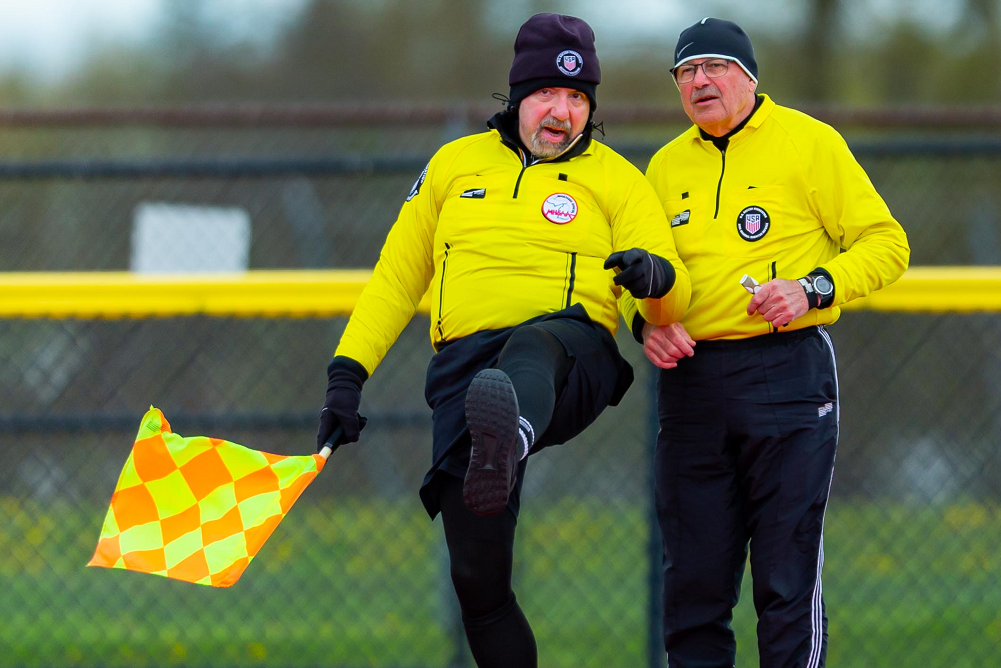
Be the Referee: Concussions
September 15, 2016
This week, MHSAA assistant director Mark Uyl discusses the official's role when an athlete experiences a possible concussion.
Be The Referee is a series of short messages designed to help educate people on the rules of different sports, to help them better understand the art of officiating, and to recruit officials.
Below is this week's segment – Concussions - Listen
In all contact sports, the biggest issue of the day continues to be concussions. Game officials play a vital role in keeping athletes safe on the field, court, ice and mat.
While officials are never placed in the position to diagnose a possible concussion, the officials can often see when a player first becomes injured. When that possible injury is noticed by an official, all game rules require the contest be stopped and the student is evaluated by the school’s health care team.
It then becomes the call of the school to determine if the player has suffered a possible concussion. If yes, the player is out for at least the rest of that day. If no, the player can return to the contest.
Past editions
Sept 8: Equipment Covering the Knees - Listen
Sept. 1: Play Clock Experiment - Listen
Aug. 25: Clipping in the Free Blocking Zone - Listen

Be the Referee: Officials Registration
By
Sam Davis
MHSAA Director of Officials
May 30, 2023
Be The Referee is a series of short messages designed to help educate people on the rules of different sports, to help them better understand the art of officiating, and to recruit officials.
Below is this week's segment – Officials Registration - Listen
We talk a lot about the need for registered officials. But how do you sign up? What does it take to become a referee, umpire, or judge?
The steps are simple. Go to MHSAA.com to the Officials Tab, and identify the sport or sports you are interested in. Next, complete the MHSAA Principals of Officiating and the Officials Guidebook exams.
The Officials Guidebook covers basic elements and procedures for becoming a sports official. This first step of the process covers playing rules, ejection protocols, game assignments, and payment of game fees.
Once you pass the exams, it’s time to connect with a locally-approved officials association. The local associations are the ones that provide the training – whether it’s on the court, on the field, on the mats, or video training – to get that person completely immersed in the rules, mechanics, and coverages of what it takes to become a good official.
Previous Editions:
May 23: Soccer Offsides or Goal? - Listen
May 16: Track & Field Exchange Zones - Listen
May 9: Girls Lacrosse Self-Start - Listen
May 2: Baseball/Softball Overthrow - Listen
April 25: Fifth-Quarter/Third-Half Rule - Listen
April 18: Soccer Referee in Play? - Listen
April 11: Softball Strikeout - Listen
March 14: Basketball Instant Replay - Listen
March 7: Hockey Overtime - Listen
Feb. 28: Baker Bowling - Listen
Feb. 21: Ski Finish - Listen
Feb. 14: Swimming Touchpads - Listen
Feb. 7: In or Out-of-Bounds in Wrestling - Listen
Jan. 31: Over the Back - Listen
Jan. 24: Competitive Cheer Judges - Listen
Jan. 17: More Lines - Listen
Jan. 10: On the Line - Listen
Jan. 3: Basketball Measurements - Listen
Dec. 13: Pregame Dunks - Listen
Dec. 6: Gymnastics Judges - Listen
Nov. 22: Football Finals Replay - Listen
Nov. 15: Back Row Illegal Blocker - Listen
Nov. 8: Swim Turn Judges - Listen
Nov. 1: Soccer Referee Jersey Colors - Listen
Oct. 25: Cross Country Tie-Breaker - Listen
Oct. 18: Soccer Shootouts - Listen
Oct. 11: Safety in End Zone - Listen
Oct. 4: Football Overtime Penalty - Listen
Sept. 27: Kickoff Goal - Listen
Sept. 20: Soccer Timing - Listen
Sept. 13: Volleyball Replays - Listen
Sept. 6: Switching Sides - Listen
Aug. 30: Play Clock - Listen
Aug. 23: Intentional Grounding Change - Listen
PHOTO: Officials confer during a soccer match early this season. (Photo by Chris Mudd/National Photo Scout.)

